Related Research Articles
The Curragh incident of 20 March 1914, sometimes known as the Curragh mutiny, occurred in the Curragh, County Kildare, Ireland. The Curragh Camp was then the main base for the British Army in Ireland, which at the time still formed part of the United Kingdom of Great Britain and Ireland. Ireland was scheduled to receive a measure of devolved government, which included Ulster, later in the year. The incident is important in 20th-century Irish history, and is notable for being one of the few occasions since the English Civil War in which elements of the British military openly intervened in politics. It is widely thought of as a mutiny, though no orders actually given were disobeyed.

Army Officer Selection Board(AOSB) is an assessment centre used by the British Army as part of the officer selection process for the regular army and Army Reserve and related scholarship schemes. The board is based at Leighton House, Westbury in Wiltshire, England in a dedicated camp. It is commanded by the President AOSB, a colonel in the British Army, supported by a number of vice-presidents.
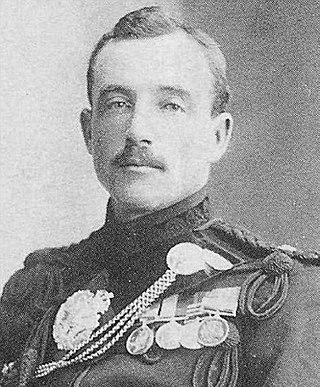
Brigadier-General Sir John Edmond Gough, was a British Army officer and a recipient of the Victoria Cross, the highest award for gallantry in the face of the enemy that can be awarded to British and Commonwealth forces.

A military staff or general staff is a group of officers, enlisted and civilian staff who serve the commander of a division or other large military unit in their command and control role through planning, analysis, and information gathering, as well as by relaying, coordinating, and supervising the execution of their plans and orders, especially in case of multiple simultaneous and rapidly changing complex operations. They are organised into functional groups such as administration, logistics, operations, intelligence, training, etc. They provide multi-directional flow of information between a commanding officer, subordinate military units and other stakeholders. A centralised general staff results in tighter top-down control but requires larger staff at headquarters (HQ) and reduces accuracy of orientation of field operations, whereas a decentralised general staff results in enhanced situational focus, personal initiative, speed of localised action, OODA loop, and improved accuracy of orientation.
The British Army Aid Group (B.A.A.G.) was a para-military organisation for British and Allied forces in southern China during the Second World War. The B.A.A.G. was officially classified in the British Army's order of battle as an MI9 unit that was responsible for assisting prisoners of war and internees to escape from the Imperial Japanese Army's camps.

The Royal Army Veterinary Corps (RAVC), known as the Army Veterinary Corps (AVC) until it gained the royal prefix on 27 November 1918, is an administrative and operational branch of the British Army responsible for the provision, training and care of animals. They are also responsible for explosives and drug search dogs. It is a small corps, forming part of the Army Medical Services.

The Curragh Camp is an army base and military college in The Curragh, County Kildare, Ireland. It is the main training centre for the Irish Defence Forces and is home to 2,000 military personnel.
The U.S. Army was founded on 14 June 1775, when the Continental Congress authorized enlistment of riflemen to serve the United Colonies for one year.
In the United States Armed Forces, a brigadier general is a one-star general officer in the United States Army, Marine Corps, Air Force, and Space Force.
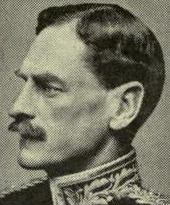
Major General Sir Thompson Capper, was a highly decorated and senior British Army officer who served with distinction in the Second Boer War and was a divisional commander during the First World War. At the Battle of Loos in 1915, Capper was shot by a sniper as he reconnoitered the front line during an assault by his division on German positions. He died the next day in a casualty clearing station from wounds to both lungs; his grave is in the nearby Lillers Communal Cemetery.
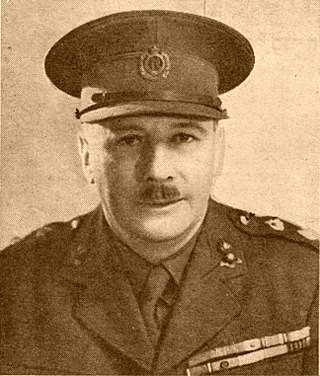
Frederick Hermann Kisch, was a decorated British Army officer and Zionist leader. A Brigadier, he was the highest ranking Jew to serve in the British Army.
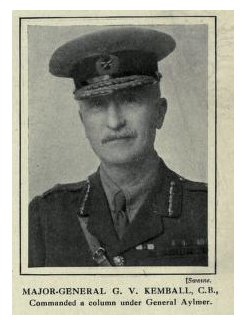
Major-General Sir George Vere Kemball, KCMG, CB, DSO, R.A. (1859–1941) was a British Army officer of the 19th and early 20th century. He was a career officer in the British Army spending most of his career in India and Nigeria.
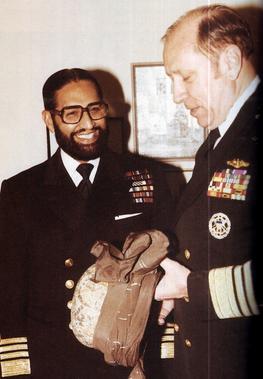
Admiral Mohammad ShariffNI(M) HJ HI(M) LoM, was a Pakistani senior admiral who served as the 2nd Chairman of Joint Chiefs of Staff Committee and a memoirist who was at the center of all the major decisions made in Pakistan in the events involving the war with India in 1971, the enforcement of martial law in the country in 1977, and the decision in covertly intervening against Soviet Union in Afghanistan.

Lieutenant-General Sir John Spencer Ewart was a British Army officer who became Adjutant-General to the Forces, but was forced to resign over the Curragh Incident.

Major-General Sir Kenneth William Dobson Strong was a senior officer of the British Army who served in the Second World War, rising to become Director General of Intelligence. A graduate of the Royal Military College, Sandhurst, Strong was commissioned into the 1st Battalion, Royal Scots Fusiliers in 1920. After service as an Intelligence Officer with his battalion in Ireland from 1920 to 1922 during the Irish War of Independence, he volunteered for service as an interpreter and was posted to Germany with the British Army of the Rhine. In 1935 he returned to Germany as a member of the International Force supervising the Saarland plebiscite. Afterwards, he joined the German Intelligence Section at the War Office. In 1937 he became Assistant Military attaché in Berlin.
Brigadier General Hubert John Foster was a senior officer in the British Army and later Australian Army, who served as Chief of the Australian General Staff from 1916 to 1917.

Lieutenant General Sir Wilfrid Gordon Lindsell was a senior British Army logistics officer in the Second World War.
George Ronald Hargreaves OBE, FRCP, MRCS was a civilian and military psychiatrist.

Civil Resettlement Units, or CRUs, was a scheme created during the Second World War by Royal Army Medical Corps psychiatrists to help British Army servicemen who had been prisoners of war (POWs) to return to civilian life, and to help their families and communities to adjust to having them back. Units were set up across Britain from 1945 and later expanded to provide for Far East Prisoners of War (FEPOWs) as well as those who had been captive in European camps. By March 1947, 19,000 European POWs and 4,500 FEPOWs had attended a unit.
War Office Selection Boards, or WOSBs, were a scheme devised by British Army psychiatrists during World War II to select potential officers for the British Army. They replaced an earlier method, the Command Interview Board, and were the precursors to today's Army Officer Selection Boards. The WOSBs were also later adapted to civilian purposes such as selecting civil servants and firemen.
References
- ↑ "Rose Vinden". Telegraph Announcements. The Telegraph. March 2005. Retrieved 13 June 2016.[ permanent dead link ]
- 1 2 3 4 5 6 B.S.C. (10 February 1977). "Brigadier F.H. Vinden". The Times. London.
- ↑ "Private Papers of Brigadier F H Vinden CIE". Imperial War Museums. 2007. Retrieved 13 June 2016.
- ↑ "British officers speak of Irish conflict". Sunday Business Post. Cork. 15 January 2006.
- 1 2 Durney, James (2011). "The Curragh internees, 1921-24: from defiance to defeat" (PDF). Journal of the County Kildare Archaeological Society and Surrounding Districts. XX: 7–24. Retrieved 6 June 2016.
- ↑ Best, Anthony (2002). British Intelligence and the Japanese Challenge in Asia, 1914-41. UK: Palgrave MacMillan. p. 1. ISBN 0333945514.
- ↑ Vinden, Frederick Hubert (1977). "The Introduction of War Office Selection Boards in the British Army: A Personal Recollection". In Bond, Brian; Roy, I. (eds.). War and Society: A Yearbook of Military History. Croom Helm. ISBN 9781138921702.
- ↑ Trahair, Richard (2015). Behavior, Technology, and Organizational Development: Eric Trist and the Tavistock Institute. Transaction Publishers. ISBN 978-1412855495.
- ↑ Vinden, Frederick Hubert (21 September 1946). "A Selection Bureau for India". The British Medical Journal. 2 (4472). BMJ: 431. doi:10.1136/bmj.2.4472.431-b. JSTOR 20367515. S2CID 220194473.